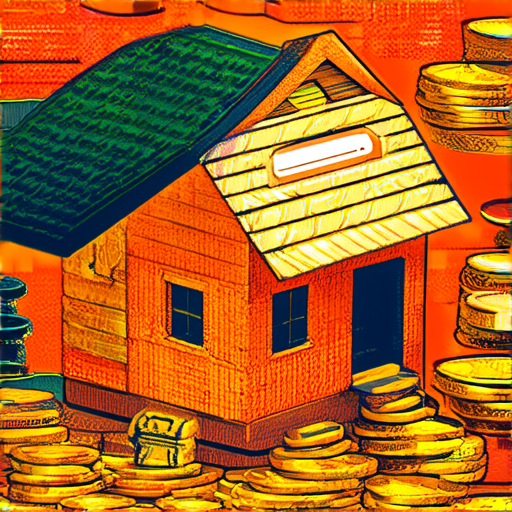For those seeking to find profitable real estate investments, navigating the complex landscape of real estate investing can be daunting. With numerous strategies and tactics available, it’s easy to get lost in the noise. However, by leveraging advanced SEO-focused article writing techniques and strategic cluster keywords, investors can gain a competitive edge in the market.

The 2 Rule in Real Estate
The 2 rule states that an investment property’s monthly rent should equal at least 2% of the purchase price.
- This means that if you buy a $200,000 property, your monthly rent should be around $4000.
- Your monthly mortgage payment should not exceed $3000.
- This rule is more extreme than the 1 rule, which requires a lower percentage of the purchase price for rent.
Why the 2 Rule Matters
The 2 rule helps real estate investors determine whether a property is likely to generate enough rental income to cover expenses and produce a profit.
- If a property meets the 2 rule criteria, it may be considered a solid investment opportunity.
- However, it’s essential to consider other factors, such as property management costs, maintenance expenses, and local market conditions.
- A thorough analysis of these factors can help you make an informed decision about investing in a particular property.
Real Estate Locations Insights
At Real Estate Locations, we understand the importance of carefully evaluating potential investment properties.
- We provide expert advice and in-depth articles to help you navigate the complex world of real estate investing.
- Our team of experienced professionals stays up-to-date on the latest market trends and investment strategies.
- We’re committed to empowering our readers with the knowledge they need to succeed in real estate investing.
Additional Resources
For more information on real estate investing and the 2 rule, check out our resources:
The Most Profitable Thing in Real Estate
Rental properties, commercial real estate, and fix-and-flip projects are some of the best options for investors seeking high profit potential.
-
Rental Properties
Rental properties can provide a steady stream of passive income through rental yields and long-term appreciation in property value.
-
Benefits:
- Steady cash flow through rental income
- Long-term appreciation in property value
- Tax benefits through depreciation and mortgage interest deductions
-
Risks:
- Market fluctuations and vacancies
- Maintenance and repair costs
- Tenant management and screening challenges
-
-
Commercial Real Estate
Commercial real estate investments can offer higher returns than residential properties due to their potential for long-term leases and stable cash flows.
-
Benefits:
- Potential for long-term leases and stable cash flows
- Highest and best use analysis for optimal returns
- Diversification opportunities through various asset classes
-
Risks:
- Market volatility and tenant turnover
- High upfront capital requirements
- Limited liquidity and exit options
-
-
Fix-and-Flip Projects
Fix-and-flip projects involve purchasing undervalued properties, renovating them, and selling them for a profit.
-
Benefits:
- Potential for quick profits through renovation and resale
- Opportunity to add value through renovations and improvements
- Diversification opportunities through various asset classes
-
Risks:
- Renovation costs and timelines
- Market fluctuations and sale uncertainty
- Liability concerns through contractor and worker interactions
-
Each type of investment offers unique benefits and risks, so it’s essential to analyze market trends and consider your financial goals before diving in.
As a seasoned investor, I recommend considering a diversified portfolio that includes a mix of these investment types to maximize returns and minimize risk.
For more information on real estate investing, visit our Real Estate Investments page.
Additionally, check out our Rental Properties guide for tips on finding and managing rental properties.
And don’t miss our Commercial Real Estate overview for insights into this lucrative investment opportunity.
Lastly, explore our Fix-and-Flip Projects section for expert advice on getting started with this exciting investment strategy.

Is $5000 Enough to Invest in Real Estate?
The short answer is yes, $5000 can be enough to invest in real estate, depending on how you choose to invest.
- Rental Properties: While traditional rental properties often require significant upfront costs, there are alternative options available. Consider investing in a real estate investment trust (REIT), which allows individuals to pool their money together to purchase and manage properties.
- Crowdfunding: Platforms like Fundrise, Rich Uncles, and RealtyMogul enable you to invest in real estate development projects or existing properties with lower minimum investment requirements, typically ranging from $500 to $5,000.
- Real Estate Mutual Funds: These funds allow you to diversify your portfolio by investing in a variety of real estate assets, such as office buildings, apartments, and shopping centers, with a relatively low initial investment requirement.
- House Hacking: This strategy involves purchasing a multi-unit property and living in one of the units rent-free, allowing you to cover the mortgage payments and expenses with rental income from the remaining units.
Key Considerations:
- Research and Due Diligence: Thoroughly evaluate potential investment opportunities, considering factors such as property type, location, cash flow, and potential for appreciation.
- Fees and Expenses: Understand the fees associated with your chosen investment option, including management fees, closing costs, and ongoing expenses.
- Tax Implications: Consult with a tax professional to understand the tax implications of your real estate investment, including depreciation, interest deductions, and capital gains taxes.
- Risk Management: Develop a risk management plan to mitigate potential losses, such as market fluctuations, tenant vacancies, or unexpected repairs.
Conclusion:
While $5000 may seem like a limited amount to invest in real estate, it can be sufficient with the right approach and careful consideration of your investment goals, risk tolerance, and financial situation. By exploring alternative investment options and conducting thorough research, you can make informed decisions and potentially achieve your real estate investment objectives.
Hottest Real Estate Market in South Carolina
The hottest real estate market in South Carolina can vary depending on factors such as location, price point, and type of property.
-
Top Cities:
- Charleston: Known for its historic architecture, beautiful beaches, and thriving downtown area, Charleston is a popular destination for homebuyers and investors alike.
- Columbia: As the state capital, Columbia offers a mix of urban and suburban living options, with a strong economy and growing job market.
- Greenville: This vibrant city has undergone significant revitalization efforts in recent years, making it an attractive option for those looking for a lively atmosphere and plenty of amenities.
-
Emerging Neighborhoods:
- Downtown Greenville: This trendy neighborhood offers upscale apartments, restaurants, and shops, making it a great option for young professionals and families.
- NoMo (North Main Street) in Columbia: This up-and-coming neighborhood features a mix of old and new homes, with easy access to downtown and the University of South Carolina campus.
- West Ashley in Charleston: This charming neighborhood boasts a small-town feel, with tree-lined streets, historic homes, and a variety of local businesses.
-
Best Areas for Investment:
- Myrtle Beach: With its strong tourism industry and growing population, Myrtle Beach is a great option for investors looking for rental properties or vacation homes.
- Summerville: Located just outside of Charleston, Summerville offers a more affordable option for those looking to invest in the area.
- Lexington County: This rapidly growing county offers a mix of rural and suburban living options, with a strong economy and plenty of opportunities for development.
When considering the hottest real estate market in South Carolina, it’s essential to weigh factors such as affordability, job growth, and quality of life. By doing your research and working with a reputable real estate agent, you can find the perfect property to suit your needs and budget.
Are Home Prices Dropping in SC?
The South Carolina housing market has seen fluctuations in recent months, with the median home sales price experiencing a decrease in the past three months.
- The current median home sales price in South Carolina stands at $380,900, which is a slight drop compared to previous months.
- This figure is still higher than the national median home sales price of $436,480, indicating a relatively stable market in the state.
Market Trends and Insights
- The South Carolina housing market is considered less competitive compared to other regions, offering opportunities for potential buyers and investors.
- Average days on market have increased, giving buyers more time to make informed decisions and negotiate prices.
- Homes are selling at a moderate pace, with a balanced supply and demand in the market.
Real Estate Market Analysis
As a seasoned real estate investor and enthusiast, I closely monitor market trends and analyze data to provide valuable insights to my audience.
- I recommend staying informed about local market conditions, economic indicators, and interest rates to make informed decisions.
- Consider working with a reputable realtor or financial advisor to navigate the complex world of real estate investing.
Investment Strategies and Opportunities
- Diversify your portfolio by exploring various investment options, such as rental properties, fixer-uppers, or vacation homes.
- Research emerging neighborhoods and communities with growth potential, considering factors like job markets, schools, and amenities.
- Stay up-to-date with local zoning laws, tax incentives, and regulatory changes affecting the real estate market.
Conclusion
In conclusion, the South Carolina housing market presents both challenges and opportunities for buyers, sellers, and investors alike.
By staying informed, adapting to market fluctuations, and seeking professional guidance, individuals can navigate the complex world of real estate and make informed decisions.

Is Now a Good Time to Sell a House in South Carolina?
The South Carolina housing market has experienced significant fluctuations in recent years, influenced by factors such as economic conditions, interest rates, and seasonal demand.
- Market Trends: As of December 2024, the South Carolina housing market remains relatively stable, with moderate price growth and increasing sales activity.
- Seller’s Market:** While the market is not as hot as it was during the pandemic, sellers still have an advantage due to low inventory levels and high demand for homes in desirable locations.
Pros of Selling a House in South Carolina Right Now:
- High Demand:** With many homebuyers seeking properties in South Carolina, sellers can expect strong interest and potentially multiple offers on their homes.
- Low Inventory:** The limited supply of available homes gives sellers leverage to negotiate better prices and terms.
- Stable Economy:** South Carolina’s economy continues to grow, driven by industries such as healthcare, technology, and tourism, which contributes to a stable job market and increased consumer confidence.
Cons of Selling a House in South Carolina Right Now:
- Rising Interest Rates:** Although interest rates remain relatively low, they have been increasing steadily, which may impact buyer affordability and reduce demand.
- Seasonal Fluctuations:** Home sales typically slow down during the winter months, which could affect the timing of a sale.
- Competition from New Construction:** As new developments and construction projects come online, they may attract potential buyers away from existing homes.
When to Consider Selling a House in South Carolina:
- Spring and Summer:** These seasons tend to see increased buyer activity and a faster pace of sales, making them ideal times to list a home.
- Desirable Locations:** Properties located in highly sought-after areas, such as Charleston, Greenville, or Hilton Head Island, may command higher prices and attract more buyers.
- Well-Maintained Homes:** Homes that are well-maintained, updated, and staged to appeal to buyers are more likely to sell quickly and for a good price.
Conclusion:
While there are pros and cons to selling a house in South Carolina right now, the current market conditions suggest that it may be a good time to sell, particularly for those who have a well-maintained home in a desirable location.
0 Comments